【英语】2014年高考英语语法讲解名词性从句
高考英语语法完全讲解——名词性从句课件(共17张PPT)

三、what/whatever与
which/whichever的区别
what/whatever意为“什么/无论什么”,描述的事物在上下 文中没有范围;which/whichever意为“哪个/无论哪个”, 描述的事物在上下文中有范围。 To be honest, I can hardly understand what/whatever you have said. Here is the dress. This is what I have been dreaming of. Here are many beautiful dresses. You can choose whichever you like.
高考英语语法完全讲解 名词性从句
定义及分类
在句中起到名词所能充当的句子成分的从句称之 为名词性从句,名词常用来作主语、宾语、表语、 同位语,因此,对应的名词性从句可以分为四大 类:主语从句、宾语从句、表语从句、同位语从 句。
主句从句
1、作句子主语的从句叫作主语从句。 2、为避免句子头重脚轻,常用形式主语it代替主语从 句,把主语从句置于句尾。常用的句型有:It is/was+ 形容词/名词/过去分词+that从句。
表语从句
位于系动词之后作表语的从句叫表语从句。 The problem is who is to pay and when we can start.
同位语从句
同位语从句说明其前面名词的具体内容。通常由that引 导,常接同位语从句的名词有:news, conclusion, possibility, rumor, certainty, story, word, mystery, idea, doubt, hope, truth, question, belief, fact, message, evidence, information, explanation, rule, probability, question, wish, thought, statement, report, opinion, principle等。
高中英语名词性从句知识讲解以及练习题 附答案
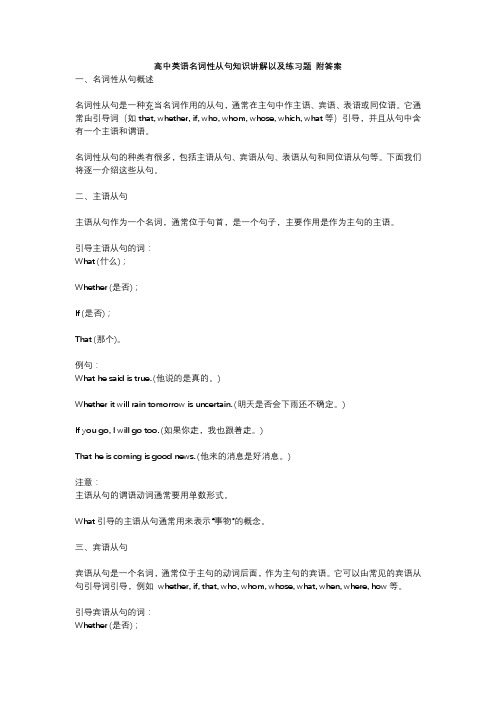
高中英语名词性从句知识讲解以及练习题附答案一、名词性从句概述名词性从句是一种充当名词作用的从句,通常在主句中作主语、宾语、表语或同位语。
它通常由引导词(如that, whether, if, who, whom, whose, which, what等)引导,并且从句中含有一个主语和谓语。
名词性从句的种类有很多,包括主语从句、宾语从句、表语从句和同位语从句等。
下面我们将逐一介绍这些从句。
二、主语从句主语从句作为一个名词,通常位于句首,是一个句子,主要作用是作为主句的主语。
引导主语从句的词:What (什么);Whether (是否);If (是否);That (那个)。
例句:What he said is true. (他说的是真的。
)Whether it will rain tomorrow is uncertain. (明天是否会下雨还不确定。
)If you go, I will go too. (如果你走,我也跟着走。
)That he is coming is good news. (他来的消息是好消息。
)注意:主语从句的谓语动词通常要用单数形式。
What引导的主语从句通常用来表示“事物”的概念。
三、宾语从句宾语从句是一个名词,通常位于主句的动词后面,作为主句的宾语。
它可以由常见的宾语从句引导词引导,例如whether, if, that, who, whom, whose, what, when, where, how等。
引导宾语从句的词:Whether (是否);If (是否);That (那个);Who (谁);Whom (谁);Whose (谁的);What (什么);When (何时);Where (何处);How (如何)。
例句:I know that he is coming. (我知道他要来。
)I wonder if he is telling the truth. (我想知道他是否说了真话。
名词性从句-完整版PPT课件精选全文

3. 连接副词:when(=the time when什么时候,何时),where(=the place where什么地方,何地),how(=the way that/in which怎样, 以……方式,如何),why=the reason why为什么)。它们除起连 接作用,还在从句中作状语。
3) wh类连接词引导的主语从句: wh类连接词包括wh类的连接代词(who, whom,
whose, which, what, whoever, whomever, whichever, whatever等)和连接副词(when,
where, how, why, whenever, wherever, however 等)。what, when和wh-ever类的词有时可不表 疑问。wh类连接代词在句中既起连接作用, 又可充当主语、宾语、表语、定语等成分。 wh类连接副词在句中起连接作用,在从句中 可充当时间、地点、原因、方式状语。
【温馨提示】 ①whether/ if引导宾语从句表示“是否”
的意思时,一般情况下可互换。 ②if引导宾语从句时可以有否定式,而
whether从句则没有。 e.g. I don’t care if he doesn’t come.
5) 特殊疑问词引导的宾语从句: 由who, what, how, which, whose, where, why等词引导的宾语从句,可作动词、 介词及形容词的宾语。
【温馨提示】 doubt, doubtful与sure后名词性从句连接词 that, whether, if的选择。 ①当doubt, doubtful用于肯定句时,后面的名
词性从句的连接词常用whether或if;当 doubt, doubtful用于否定句或疑问句时,后 面名词性从句的连接词用that。
高考英语名词性从句讲解(最全版)

引导词
名词性从句引导词的用法(1):
从句中的每一个引导词都有3个功能,分别如下:
“that”---无词义、不作成份、起连接作用
从属连词
“if”--- “是否”、不作成份、起连接作用
“whether”---“是否”、不作成份、起连接作 用
“that”---无词义、不作成份、起连接作用
1、That we will realize our dreams in the future is
1、English is very useful for us . 2、The subject I am interested in is English. 3、We need to master English well. 4、He want to learn the language , English . (同位语)
“who”---“谁”、作主语、起连接作用 “whom”--Байду номын сангаас“谁”、作宾语、起连接作用
连接代词
“what”---“事情”、作主表宾、起连接作用 “which”---“哪----”、作定语、起连接作用 “whose”---“谁的”、作定语、起连接作用
“who”---“谁”、作主语、起连接作用
1、Who will go to the college is still uncertain .
(主语从句)
2、The thing I am anxious about is whom he will turn to for help . (表语从句) 3、His mother asked him whom he could believe in .
(宾语从句)
“what”---“事情”、作主表宾语、起连接作用
高考英语语法名词性从句讲解及练习
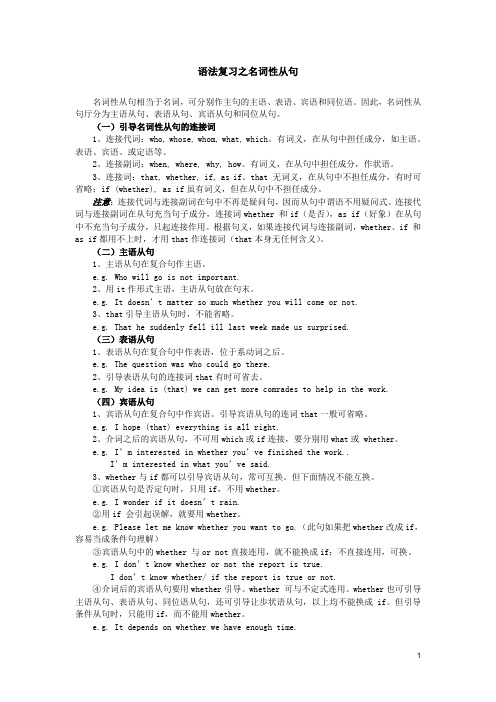
语法复习之名词性从句名词性从句相当于名词,可分别作主句的主语、表语、宾语和同位语。
因此,名词性从句厅分为主语从句、表语从句、宾语从句和同位从句。
(一)引导名词性从句的连接词1、连接代词:who, whose, whom, what, which。
有词义,在从句中担任成分,如主语、表语、宾语、或定语等。
2、连接副词:when, where, why, how。
有词义,在从句中担任成分,作状语。
3、连接词:that, whether, if, as if。
that 无词义,在从句中不担任成分,有时可省略;if (whether), as if虽有词义,但在从句中不担任成分。
注意:连接代词与连接副词在句中不再是疑问句,因而从句中谓语不用疑问式。
连接代词与连接副词在从句充当句子成分,连接词whether 和if(是否),as if(好象)在从句中不充当句子成分,只起连接作用。
根据句义,如果连接代词与连接副词,whether、if 和as if都用不上时,才用that作连接词(that本身无任何含义)。
(二)主语从句1、主语从句在复合句作主语。
e.g. Who will go is not important.2、用it作形式主语,主语从句放在句末。
e.g. It doesn’t matter so much whether you will come or not.3、that引导主语从句时,不能省略。
e.g. That he suddenly fell ill last week made us surprised.(三)表语从句1、表语从句在复合句中作表语,位于系动词之后。
e.g. The question was who could go there.2、引导表语从句的连接词that有时可省去。
e.g. My idea is (that) we can get more comrades to help in the work.(四)宾语从句1、宾语从句在复合句中作宾语。
高考英语语法知识点:名词性从句

高考英语语法知识点:名词性从句1500字名词性从句是指在句子中充当名词的成分的从句。
名词性从句分为主语从句、宾语从句、表语从句和同位语从句。
在高考英语中,名词性从句是考查的重点之一,我们需要对名词性从句的结构和用法有透彻的理解。
下面是关于名词性从句的一些重要知识点:1.主语从句主语从句在句中充当主语的作用。
主语从句通常以that引导,也可以用whether或if 引导。
例如:- That he is guilty is certain.- Whether we will win the game is yet to be seen.- If it will rain tomorrow is still uncertain.2.宾语从句宾语从句在句中充当宾语的作用。
宾语从句通常以that引导,也可以用whether或if 引导。
需要注意的是,当主句的动词是说、tell、ask、think、believe、know等表示说话、思考、感觉的动词时,常用连词that引导宾语从句,但如果宾语从句的主语与主句的主语相同,可以省略连词that。
例如:- I know that he is a good student.- She asked me if/whether I had finished my homework.- He told her (that) he loved her.3.表语从句表语从句在句中充当表语的作用。
表语从句通常以that引导,也可以用whether或if 引导。
例如:- The fact that he didn't come is disappointing.- The question is whether we should proceed with the plan.- My concern is if/whether we have enough time.4.同位语从句同位语从句用来解释或说明前面名词的具体内容或意义。
高考英语名词性从句讲解【最全版】
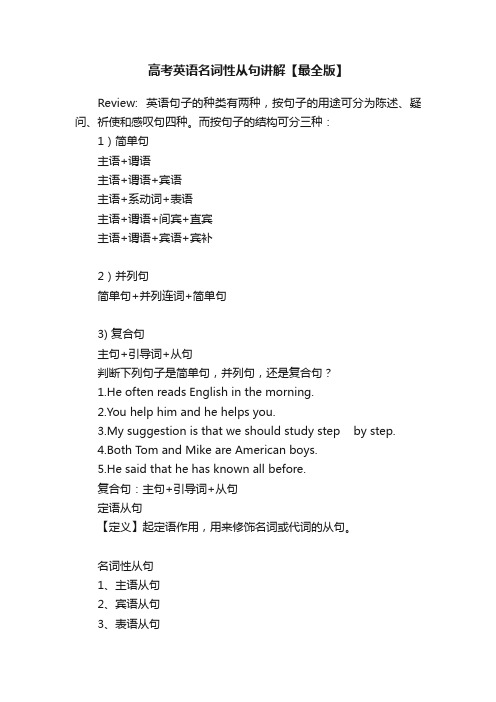
高考英语名词性从句讲解【最全版】Review: 英语句子的种类有两种,按句子的用途可分为陈述、疑问、祈使和感叹句四种。
而按句子的结构可分三种:1)简单句主语+谓语主语+谓语+宾语主语+系动词+表语主语+谓语+间宾+直宾主语+谓语+宾语+宾补2)并列句简单句+并列连词+简单句3) 复合句主句+引导词+从句判断下列句子是简单句,并列句,还是复合句?1.He often reads English in the morning.2.You help him and he helps you.3.My suggestion is that we should study step by step.4.Both Tom and Mike are American boys.5.He said that he has known all before.复合句:主句+引导词+从句定语从句【定义】起定语作用,用来修饰名词或代词的从句。
名词性从句1、主语从句2、宾语从句3、表语从句4、同位语从句在英语的句子结构中,如果本该由名词充当的主语、宾语、表语和同位语,由一个句子来充当,那么这个句子就叫__名词性从句__。
【定义】起名词性作用的从句,叫名词性从句。
换言之,在英语的句子结构中,本来该由名词充当的主语、宾语、表语和同位语部分,换由一个句子来充当,这样的句子就是名词性从句。
关联学习:Related Conception (相关概念)表示人或事物的名称的词叫名词。
The boy is Li Ming.主语:The boy 名词,表语:Li Ming 名词Miss. Liang , a 24-year-old girl, teaches us English . 主语:Miss. Liang 同位语:a 24-year-old girl 宾语: English名词在句中主要作主语、宾语、表语和同位语。
1. The boy is Li Ming.2. What he said is correct.在句中充当主语的从句叫做主语从句。
(完整版)高中英语语法总结-名词性从句
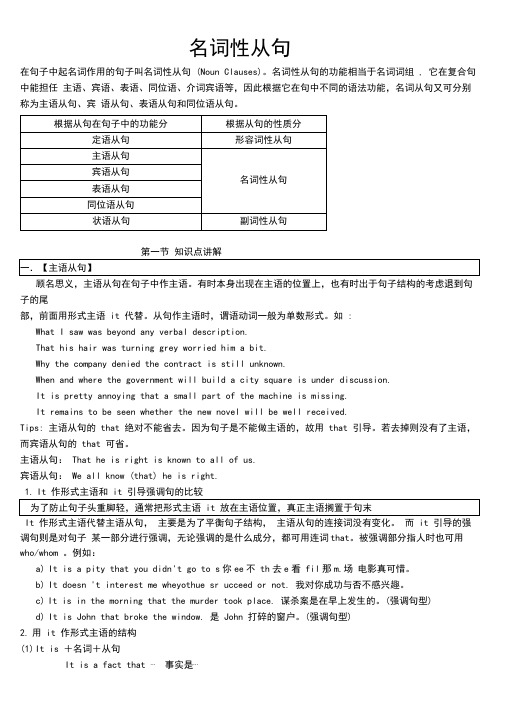
名词性从句在句子中起名词作用的句子叫名词性从句 (Noun Clauses)。
名词性从句的功能相当于名词词组 , 它在复合句中能担任主语、宾语、表语、同位语、介词宾语等,因此根据它在句中不同的语法功能,名词从句又可分别称为主语从句、宾语从句、表语从句和同位语从句。
第一节知识点讲解顾名思义,主语从句在句子中作主语。
有时本身出现在主语的位置上,也有时出于句子结构的考虑退到句子的尾部,前面用形式主语 it 代替。
从句作主语时,谓语动词一般为单数形式。
如 :What I saw was beyond any verbal description.That his hair was turning grey worried him a bit.Why the company denied the contract is still unknown.When and where the government will build a city square is under discussion.It is pretty annoying that a small part of the machine is missing.It remains to be seen whether the new novel will be well received.Tips: 主语从句的 that 绝对不能省去。
因为句子是不能做主语的,故用 that 引导。
若去掉则没有了主语,而宾语从句的 that 可省。
主语从句: That he is right is known to all of us.宾语从句: We all know (that) he is right.1.It 作形式主语和 it 引导强调句的比较It 作形式主语代替主语从句,主要是为了平衡句子结构,主语从句的连接词没有变化。
而 it 引导的强调句则是对句子某一部分进行强调,无论强调的是什么成分,都可用连词that。
【整理】2014年高考英语语法专项训练 名词性从句

名词性从句一、知识储备种类作用常用关联词例句主语从句在复合句中做主语,相当于名词,一般置谓语之前,也可用it作形式主语,主语从句放主句之后that,whether, if,as if, asthough, who,whose, which,how, when,where, why,what,whatever,whoever,whereverWhether he will come or notdoesn’t matter much.Whoever comes here will bewelcome.表语从句在复合句中做表语,相当于名词,位于系动词之后It looks as if it is going tosnow.宾语从句在复合句中做宾语,相当于名词He asked me which team couldwin the game.同位语从句放在名词之后(news,problem, idea, suggestion,advice, thought, hope, fact等) 表明其具体内容You have no idea how worriedwe are.The fact that he lied againgreatly surprised us.二、考点及考查频率1.宾语从句:①连接代词 (32/101 )②连接副词(11/101 ) ③连接词(2/101)2. 主语从句:①连接代词(14/101) ②连接词(1/101)3. 表语从句:①连接副词(6/101) ②连接代词 (3/101)4. 同位语从句:(16/101)5.wh-ever引导的名词性从句:(10/101)6.that用法(6/101)(1)宾语从句连接代词高三1.How much one enjoys h imself travelling depends largely on he goes with,whether his friends or relatives.A.what B.who C.how D.why2. I want to be liked and loved for I am inside.名词性从句A. whoB. whereC. whatD. how3.Before the sales start, I make a list of ______ my kids will need for the coming season.名词性从句A. whyB. whatC.howD. which4. As a new g raduate, he doesn’t know it takes to start a business here.A. howB. whatC. WhenD. which5. Many young people in the West are expected to leave __ could be life' s most important decision -- marriage -- almost entirely up to luck.A. asB. thatC. whichD. what6.2.The companies are working together to create _____ they hope will be the best means of transport in the 21st century.A. whichB. thatC. whatD. who7.When asked _____ they needed most, the kids said they wanted to feel important and loved.A. whatB. whyC. whomD. which8.People in Chongqing are proud of they have achieved in the past ten years.A. thatB. whichC. whatD. how9.Some children want to challenge themselves by learning a language different from ____ their parents speak at home.A. whatB. thatC. whichD. one10.You can only be sure of ____you have at present; you cannot be sure of something ___ you might get in the future.A. that; whatB. what; /C. which; thatD. /; that11.Choosing the right dictionary depends on ______you want to use it for.A. whatB. whyC. howD. whether12.By improving reading skills, you can read faster and understand more of you read.A.that B.what C.which D.whether13.--- Could you do me a favour?--- It depends on ______ it is.A. whichB. whicheverC. whatD. whatever14.–What did your parents think about your decision?–They always let me do _____ I think I should.A. whenB. thatC. howD. what15.He spoke proudly of his part in the game, without mentioning ____ his teammates had done.A. whatB. whichC. whyD. while16.I was surprised by her words, which made me recognize ___ silly mistakes I had made.A. whatB. thatC. howD. which17.The way he did it was different _______ we were used to .A.in which B.in what C.from what D.from which18.The shopkeeper did not want to sell for ______ he thought was not enough.A. whereB. howC. whatD. which19.The other day, my brother drove his car down the street at ___ I thought was a dangerous speed.A. asB. whichC. whatD. that20.A modern city has been set up in ___was a wasteland ten years ago .A. whatB. whichC. thatD. where21.I think Father would like to know ____ I've been up to so far, so I decide to send him a quick note.A. whichB. whyC. whatD. how22.Afte r Yang Li wei succeeded in circl ing the earth, _______ our astronauts desireto do is walk in space.A. whereB. whatC. thatD. how23.People have heard what the President has said;they are waiting to see _____ hewill do.A.how B.what C.when D.that24.—I think it’s going to be a big problem. —Yes, it could be.—I wonder __ we can do about it.A. ifB. howC. whatD. that25.When you answer questions in a job interview. Please remember the golden rule;Always give the monkey exactly __ he wants.A. whatB. whichC. whenD. that26.The mother didn't know _____ to blame for the broken glass as it happened whileshe was out.A. whoB. whenC. howD. what27.It is said in Australia there is more land than the government knows ____.A. it what to do withB. what to do it withC. what to do with itD. to do whatwith it28.Perseverance is a kind of quality--- and that's ____ it takes to do anything well.A. whatB. thatC. whichD. why29.A computer can only do ____ you have instructed it to do.A. howB. afterC. whatD. when30.Little Tommy was reluctant to tell the schoolmaster ____ he had done the day before.A.That B.how C.Where D.what高二31.No one can be sure _____ in a million years.A.what man will look likeB. what will man look likeC. man will look like whatD. what look will man like高一32.These photographs will show you ______.A. what does our village look likeB. what our village looks likeC. how does our village look likeD. how our village looks like连接副词高三1.We haven’t dicussed yet _______ we are going to place our new furniture.名词性从句A.that B.which C.what D.where2.Cindy shut the door heavily and burst into tears. No one in the office knew shewas so angry.名词性从句A. whereB. whetherC. thatD. why3. —It’s no use having ideas only.—Don’t worry. Peter can show you to turn an idea into an act.名词性从句A. howB. whoC. whatD. where4.— I wonder ________ you’ll water this kind of flower .—Every other day.A. how oftenB. how longC. how soonD. how much5.Mary wrote an article on _______the team had failed to win the game .A.why B.what C.who D.that6.The old lady’s hand shook frequently. She explained to her doctor ______ this shaking had begun half a year before, and _____, only because of this, she had been forced to give up her job.A. when ; howB. how ; whenC. how ; howD. why ; why7.Parents are taught to understand ______ important education is to their children's future.A. thatB. howC. suchD. so高二8.—Do you remember ______ he came?—Yes, I do, he came by car.A. howB. whenC. thatD. if9.I remember____ this used to be a quiet village.A. whenB. howC. whereD. what10.Can you make sure ______ the gold ring?A.where Alice had putB.where had Alice putC.where Alice has putD.where has Alice put高一11.Can you tell me _____the railway station?A. how I can get toB. how can I get toC. where I can get toD. where canI get to连接词高三1.We haven't settled the question of ______ it is necessary for him to study abroad.A. ifB. whereC. whetherD. that高一2.Ask her_____ come with me.A if she willB if will sheC whether will sheD will she(2)主语从句连接代词高三1._____ is known to us all is that the 2008 Olympic Games will take place in Beijing.A. ItB. WhatC. AsD. Which2._____ was most important to her, she told me, was her family.A. ItB. ThisC. WhatD. As3._____ matters most in learning English is enough practice.A. WhatB. WhyC. WhereD. Which4.It is none of your business ______ other people think about you. Believe yourself.It句型A. howB. whatC. whichD. w hen5. parents say and do has a life-long effect on their children.A. ThatB. WhichC. WhatD. As6.____ he referred to in his article was unknown to the general reader.A. ThatB. WhatC. WhetherD. Where7.____makes this shop different is that it offers more personal services.A. WhatB. WhoC. WhateverD. Whoever8.After Yang Li wei succeeded in circling the earth, _______ our astronauts desireto do is walk in space.A. whereB. whatC. thatD. how9.____ made the school proud was _____ more than 90%of the students had beenadmitted to key universities.A. What; becauseB. What; thatC. That; whatD. That; because10.It is pretty well understood ___ controls the flow of carbon dioxide in andout the atmosphere today. It句型A. thatB. whenC. whatD. how11.I read a bout it in some book or other, does it matter_______it was?A.where B.what C.how D.which高二12.____ he said at the meeting astonished everybody present.A. WhatB. ThatC. The factD. The matter高一13._______ you have done might do harm to other people.A. ThatB. WhatC. WhichD. This14.______ he said is true.A. WhatB. ThatC. WhichD. Whether连接词高二1____ the 2000 Olympic Games will be held in Beijing is not known yet.A. WheneverB. IfC. WhetherD. That(3)表语从句连接副词高三1.-I prefer shutting myself in and listening to music all day on Sundays.-T hat’s_______I don’t agree .You should have a more active life.A.whereB.howC.whenD.what2.The last time we had great fun was _____ we were visiting the Water Park.A. whereB. howC. whenD. why3.Why not try your lick downtown, Bob? That’s ______ the best jobs are.A. whereB. whatC. whenD. why4.You are saying that everyone should be equal, and this is _______I disagree.A. whyB. whereC. whatD. how高二5.-Idrove to Zhuhai for the air show last week. -Is that __ you had a few days off?A. whyB. whenC. whatD. where6.Go and get your coat. It's _____ you left it.A. thereB. whereC. there whereD. where there连接代词1.See the flags on top of the building? That was______ we did this morning. 连接A. whenB. whichC. whereD. What2.Great changes have taken place in that school. It is no longer _____ it was 20 years ago, _____ poorly equipped. 连接A. what; whenB. that; whichC. what; whichD. which; that3.—Are you still thinking about yesterday's game?—Oh,that's_____ .A.what makes me feel excited B.whatever I feel excited aboutC.how I feel about it D.when I feel exci ted(4)同位语从句高三1.A warm thought suddenly came to me ______I might use the pocket money to buysome flowers for my mother’s birthday.A.if B.when C.that D.which2.--- It's thirty years since we lest met.--- But I still remember the story, believe it or not, ____we got lost on a rainy night.A. whichB. thatC. whatD. when3.There is much chance _____Bill will recover from his injury in time for therace.A. thatB. whichC. untilD. if4.Nobody believed his reason for being absent form the class ____he had to meethis uncle at the air port.A. whyB. thatC. whereD. because5.Along with the letter was his promise ____ he would visit me this comingChristmas.A. whichB. thatC. whatD. whether6.A story goes ______ Elizabeth I of England liked nothing more that beingsurrounded by clever and qualified noblemen at court.A. whenB. whereC. whatD. that7.There is a new problem involved in the popularity of private cars ____ roadconditions need ___.A. that; to be improvedB. which; to be improvedC. where; improvingD. when; improving8.There's a feeling in me ____ we'll never know what a UFO is ---not ever. (2002上海)A. thatB. whichC. of whichD. whatrmation has been put forward ___ more middle school graduates will beadmitted into universities.A. whileB. thatC. whenD. as10.News came from the school office ________Wang Lin had been admitted to Beijing University. A. which B. what C. that D. where 11. — Is there any possibility ________ you could pick me up at the airport ?— No problemA. whenB. thatC. whetherD. what12. We should consider the students’ reques t ___the school library provide more books on popular science.A. thatB. whenC. whichD. where13. The fact has worried many scientists ____ the earth is becoming war mer and warmer these years.A. whatB. whichC. thatD. though14.Tomorrow is Tom’s birthday. Have you got any id ea the party is to be held?A. whatB. whichC. thatD. where15.Do you have any idea ________ is actually going on in the classroom?A.that B.what C.as D.which高一16.They have no idea at all ______ .A. where he has goneB. where did he goC. which place has he goneD. where has he gone(5)wh-ever引导的名词性从句高三1.-- How about camping this weekend, just for a change?-- OK, __ you want.(2010浙江)A. whicheverB. howeverC. whateverD. whoever2.______wants to stay in a hotel has to pay their own way.A. AnyoneB. The oneC. WhoeverD. Who3.____ team wins on Saturday will go through to the national championships.A. No matter whatB. No matter which C Whatever D. whichever4.The poor young man is ready to accept ______ help h e can get.A.whichever B.however C.whatever D.whenever5.Eat _______ cake you like and leave the others for _______ comes in late.A. any; whoB. every; whoeverC. whichever; whoeverD. eit her; whoever6.These wild flowers are so special I would do ______ I can to save them.A. whateverB. thatC. whichD. whichever高二7.It is generally considered unwise to give a child _____he or she wants.A. howeverB. whateverC. whicheverD. whenever8. She is very dear to us. We have been prepared to do ______ it takes to save her life.A. whicheverB. howeverC. whateverD. whoever9.Could I speak to ______ is in charge of International Sales please?A. whoB. whatC. whoeverD. whatever10.The how-to book can be of help to _______ wants to do the job.A.who B.whomever C.no matter who D.whoever(6)that 用法高三1.Having checked the doors were closed , and ______ all the lights were off, the boy opened the door to his bedroom.A. whyB. thatC. whenD. where2.The thought of going back home was kept him happy while he was working abroad.A.that B.all that C.all what D.which3.The traditional view is ______ we sleep because our brain is “programmed” to make us do so.A. whenB. whyC. whetherD. that4.With his work completed, the businessman stepped back to his seat, feeling pleased ____he was a man of action.A. whichB. that C .what D. whether5.____ made the school proud was _____ more than 90%of the students had been admitted to key universities.A. What; becauseB. What; thatC. That; whatD. That; because6.__ fashion differs from country to country may reflect the cultural differences from one aspect.A. WhatB. ThatC. ThisD. Which三、易错题1.I prefer shutting myself in and listening to music all day on Sundays.-That’s_______I don’t agree .You should have a mo re active life.A.whereB.howC.whenD.what2. I want to be liked and loved for I am inside.名词性从句A. whoB. whereC. whatD. how3.The last time we had great fun was _____ we were visiting the Water Park.A. whereB. howC. whenD. why4.______wants to stay in a hotel has to pay their own way.A. AnyoneB. The oneC. WhoeverD. Who5.You can only be sure of ____you have at present; you cannot be sure of something ___ you might get in the future.A. that; whatB. what; /C. which; thatD. /; that6.Having checked the doors were closed , and ______ all the lights were off, the boy opened the door to his bedroom.A. whyB. thatC. whenD. where7.Why not try your lick downtown, Bob? That’s ______ the best jobs are.A. whereB. whatC. whenD. why8.The thought of going back home was kept him happy while he was working abroad.A.that B.all that C.all what D.which9.The traditional view is ______ we sleep because our brain is “programmed” to make us do so.A. whenB. whyC. whetherD. that10.____ team wins on Saturday will go through to the national championships.A. No matter whatB. No matter which C Whatever D. whichever11.Great changes have taken place in that school. It is no longer _____ it was 20 years ago, _____ poorly equipped.A. what; whenB. that; whichC. what; whichD. which; that12.Some researchers believe that there is no doubt ______ a cure for AIDS will be found.A. whichB. thatC. whatD. whether13.The old lady's hand shook frequently. She explained to her doctor ______ this shaking had begun half a year before, and _____, only because of this, she had been forced to give up her job.A. when; howB. how; whenC. how; howD. why; why14.Parents are taught to understand ______ important education is to their children's future.A. thatB. howC. suchD. so15.You are saying that everyone should be equal, and this is _______I disagree.A. whyB. whereC. whatD. how16.__ fashion differs from country to country may reflect the cultural differences from one aspect.A. WhatB. ThatC. ThisD. Which17.____ the 2000 Olympic Games will be held in Beijing is not known yet.A. WheneverB. IfC. WhetherD. That18.No one can be sure _____ in a million years.A.what man will look likeB. what will man look likeC. man will look like whatD. what look will man like19.We should consider the students’ request ___the school library provide more books on popular science. (重庆)A. thatB. whenC. whichD. where答案1、宾语从句ACBB D CACAB ABCDA ACCCA CBBCA ACACD A BDDA AA CBACA2、主语从句BCABC BABBC BABAC3、表语从句A CABA BDAA4、同位语从句CBABB DAABC BACCA A5、wh-ever引导的名词性从句C CDCC ABCCD6、that用法BBDBB B易错题AC CCB BABDD ABCBB BCAA。
英语名词性从句讲解【完整版】

2、I asked him if he could do me a favor .
If与whether的区别:
1、If不能引导放于句首的主语从句,而whether可以。 2、引导表语从句用whether,不用if。 3、引导同位语从句用whether,不用if。 4、whether可以引导从句作介词的宾语,不用if 。 5、whether or not 连在一起可以,但if不可以。而 “whether-----or not = if -----or not”
同位语从句:
定义:在复合句中充当同位语的句子。 同位语从句用来对其前面的抽象名词进行解释说明,被解释说明的词和 同位语在逻辑上是主表关系。 同位语常见名词:fact, suggestion, advice, idea, decision, news, thought, hope, belief, truth, doubt, promise, possibility, truth, warning, message, reason, report, question,explanation, wish, problem等。 常见的连接词:that, whether, what, who, how, when, where等。 用法: The thought that I want to buy my mother a birthday gift makes me excited.that 引导的同位语从句,解释说明 thought,从句不缺成 分 There is some doubt whether he will come. whether 引导同位语从句,if 不能引导同位语从句 we haven’t made the decision where we are going to spend our vacation. 有时同位语从句可以不紧跟解释说明的名词后面。 The news is surprising that he won the match.
高中英语语法---名词性从句详解
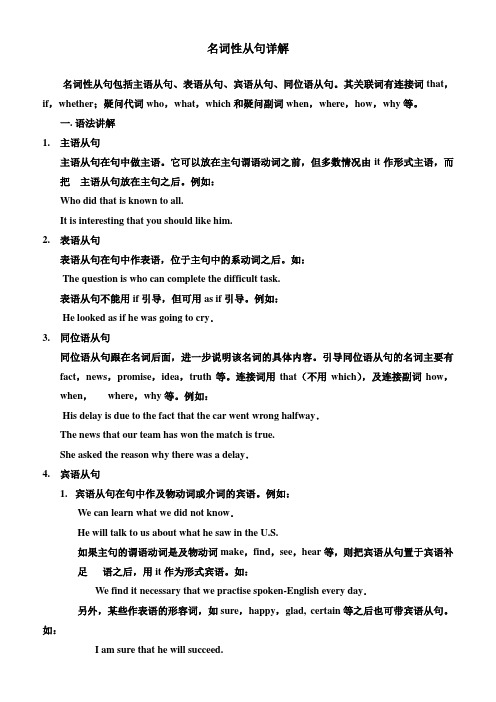
名词性从句详解名词性从句包括主语从句、表语从句、宾语从句、同位语从句。
其关联词有连接词that,if,whether;疑问代词who,what,which和疑问副词when,where,how,why等。
一.语法讲解1.主语从句主语从句在句中做主语。
它可以放在主句谓语动词之前,但多数情况由it作形式主语,而把主语从句放在主句之后。
例如:Who did that is known to all.It is interesting that you should like him.2.表语从句表语从句在句中作表语,位于主句中的系动词之后。
如:The question is who can complete the difficult task.表语从句不能用if引导,但可用as if引导。
例如:He looked as if he was going to cry.3.同位语从句同位语从句跟在名词后面,进一步说明该名词的具体内容。
引导同位语从句的名词主要有fact,news,promise,idea,truth等。
连接词用that(不用which),及连接副词how,when,where,why等。
例如:His delay is due to the fact that the car went wrong halfway.The news that our team has won the match is true.She asked the reason why there was a delay.4.宾语从句1.宾语从句在句中作及物动词或介词的宾语。
例如:We can learn what we did not know.He will talk to us about what he saw in the U.S.如果主句的谓语动词是及物动词make,find,see,hear等,则把宾语从句置于宾语补足语之后,用it作为形式宾语。
高考英语名词性从句详解
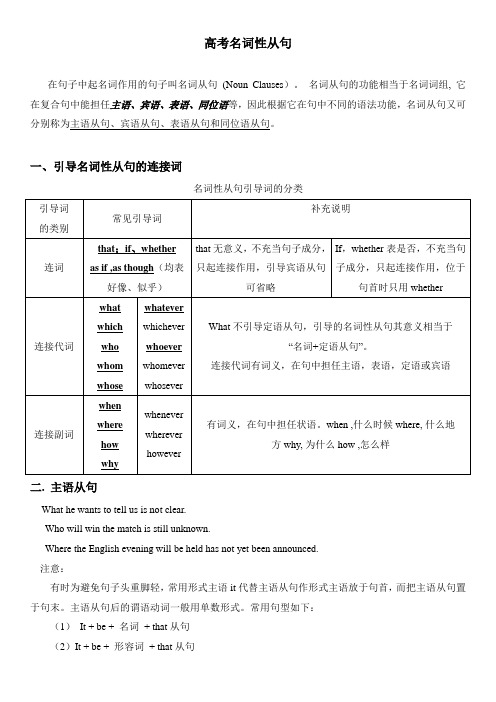
高考名词性从句在句子中起名词作用的句子叫名词从句(Noun Clauses)。
名词从句的功能相当于名词词组, 它在复合句中能担任主语、宾语、表语、同位语等,因此根据它在句中不同的语法功能,名词从句又可分别称为主语从句、宾语从句、表语从句和同位语从句。
一、引导名词性从句的连接词名词性从句引导词的分类二.主语从句What he wants to tell us is not clear.Who will win the match is still unknown.Where the English evening will be held has not yet been announced.注意:有时为避免句子头重脚轻,常用形式主语it代替主语从句作形式主语放于句首,而把主语从句置于句末。
主语从句后的谓语动词一般用单数形式。
常用句型如下:(1)It + be + 名词+ that从句(2)It + be + 形容词+ that从句(3)It + be + 动词的过去分词+ that从句(4)It + 不及物动词+ that 从句当堂练习:(1)It is immediately clear ____ the financial crisis will soon be over.(2)____ was most important to her, she told me, was her family.(3)watch was lost is unknown.(4)he finished writing the composition in such a short time surprised us all.三、宾语从句We must never think (that) we are good in everything while others are good in nothing.He has told me that he will go to Shanghai tomorrow.(由连接词that引导宾语从句时,that在句中不担任任何成分,在口语或非正式的文体中常被省去,但如从句是并列句时,第二个分句前的that不可省。
高考英语名词性从句讲解

If与whether的区别:
1、If不能引导放于句首的主语从句,而whether可以。 2、引导表语从句用whether,不用if。 3、引导同位语从句用whether,不用if。 4、whether可以引导从句作介词的宾语,不用if 。 5、whether or not 连在一起可以,但if不可以。而 “whether-----or not = if -----or not”
表语从句
“whether”---“是否”、不作成份、起连接作用
1、Whether she will come back on time depends on
weather(. 主语从句)
2、The problem is whether you could give us some
valuable advice(. 表语从句)(宾语从句)
(宾语从句)
“whom”---“谁”、作宾语、起连接作 用
1、Whom you will learn from is worth thinking over .
(主语从句)
2、The thing I am anxious about is whom he will turn
to for help .
{ 主语 What he does is important.
{ 表语 This is his job. This is what he does every day.
{ 宾语
I don’t like his job. I don’t like what he does every day.
{I don’t know about the man, Mr. White.
高考英语名词性从句语法知识点讲解
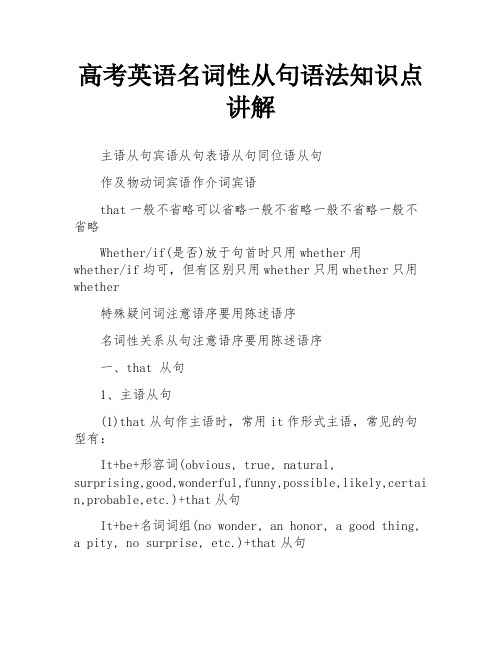
高考英语名词性从句语法知识点讲解主语从句宾语从句表语从句同位语从句作及物动词宾语作介词宾语that一般不省略可以省略一般不省略一般不省略一般不省略Whether/if(是否)放于句首时只用whether用whether/if均可,但有区别只用whether只用whether只用whether特殊疑问词注意语序要用陈述语序名词性关系从句注意语序要用陈述语序一、that 从句1、主语从句(1)that从句作主语时,常用it作形式主语,常见的句型有:It+be+形容词(obvious, true, natural,surprising,good,wonderful,funny,possible,likely,certai n,probable,etc.)+that从句It+be+名词词组(no wonder, an honor, a good thing, a pity, no surprise, etc.)+that从句It+be+过去分词(said, reported, thought, expected, decided, announced, arranged, etc.)+that从句(2)that可以省略,但that从句位于句首时,that不能省略。
2、宾语从句(1)常见的可以接that从句作宾语的动词有see, say, know, imagine, discover, believe, tell, show, think, consider, be sure, be afraid等。
在可以接复合宾语的动词之后,如think, make, consider等,可以用it作形式宾语。
(2)That从句一般不能充当介词宾语,偶尔可作except, in 的宾语。
3、表语从句(that不可省略)4、同位语从句连词that引导同位语从句时,应在某些抽象名词之后,如:fact, hope, desire, thought, suggestion, idea, news, problem, possibility等,对前面的名词起补充说明的作用,that在从句中不担当任何成分,不能省略。
(新课标)2014高三英语总复习 语法专项突破六 名词性从句和虚拟语气课件 北师大版

①I don’t think you are right. ②I don’t suppose he cares, does he? ③I hate it when they talk with their mouth full of food.
高考调研
北师大版· 英语 · 高三总复习
一般情况下介词后只能用wh-类 连接词引导宾语从句,但except, in, but等也可跟that引导的宾语从 宾 句。其他介词后面需要用that从 语 句作宾语时,必须用it作形式宾语 从 句 动词find, feel, think, consider, make, believe等后有宾语补足语 时,需要it作形式宾语而将that宾 语从句后置
高考调研
主句的主语是idea, advice, suggestion, order, request, requirement等名词时表语从 句的谓语用“(should+)动词 原形”形式
表语 从句 和同 位语 从句 在order, suggestion, advice 等名词后的同位语从句中,谓 语动词要用“(should+)动词 原形”形式
高考调研
北师大版· 英语 · 高三总复习
在demand / desire / insist / order / ⑦The teacher suggested propose / recommend / require / that we(should) call off the suggest /request / advise / plan. command等表示要求、愿望、命令、 宾 建议等动词后,that从句中常用 语 (should+)动词原形 从 句 在由doubt, doubtful引导的宾语从句 ⑧I doubt whether / if he 中,如果主句为肯定句,宾语从句的连 can pass the exam. 接词用whether / if,在否定句或疑问 ⑨I don’t doubt that he will 句中,宾语从句的连接词常用that pass the exam.
高考英语名词性从句详解
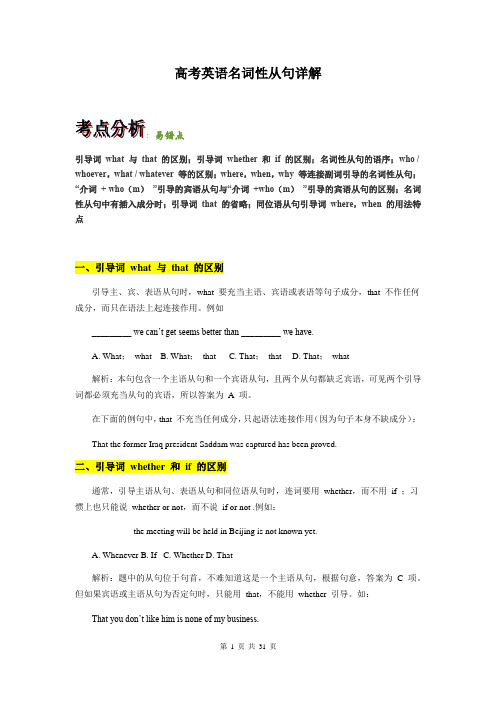
高考英语名词性从句详解易错点引导词what 与that 的区别;引导词whether 和if 的区别;名词性从句的语序;who / whoever,what / whatever 等的区别;where,when,why 等连接副词引导的名词性从句;“介词+ who(m)”引导的宾语从句与“介词+who(m)”引导的宾语从句的区别;名词性从句中有插入成分时;引导词that 的省略;同位语从句引导词where,when 的用法特点一、引导词what 与that 的区别引导主、宾、表语从句时,what 要充当主语、宾语或表语等句子成分,that 不作任何成分,而只在语法上起连接作用。
例如_________ we can’t get seems better than _________ we have.A. What;whatB. What;thatC. That;thatD. That;what解析:本句包含一个主语从句和一个宾语从句,且两个从句都缺乏宾语,可见两个引导词都必须充当从句的宾语,所以答案为A 项。
在下面的例句中,that 不充当任何成分,只起语法连接作用(因为句子本身不缺成分):That the former Iraq president Saddam was captured has been proved.二、引导词whether 和if 的区别通常,引导主语从句、表语从句和同位语从句时,连词要用whether,而不用if ;习惯上也只能说whether or not,而不说if or not .例如:_________ the meeting will be held in Beijing is not known yet.A. WheneverB. IfC. WhetherD. That解析:题中的从句位于句首,不难知道这是一个主语从句,根据句意,答案为 C 项。
但如果宾语或主语从句为否定句时,只能用that,不能用whether 引导。
2014年全国高考英语试题分类汇编 语法填空(含解析)
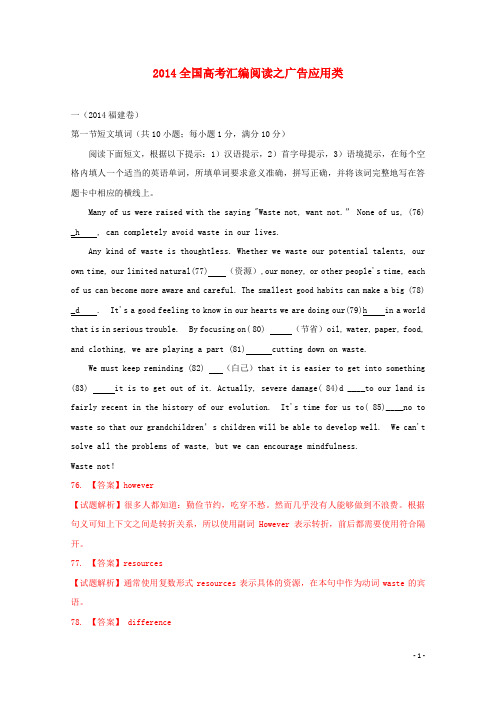
2014全国高考汇编阅读之广告应用类一(2014福建卷)第一节短文填词(共10小题;每小题1分,满分10分)阅读下面短文,根据以下提示:1)汉语提示,2)首字母提示,3)语境提示,在每个空格内填人一个适当的英语单词,所填单词要求意义准确,拼写正确,并将该词完整地写在答题卡中相应的横线上。
Many of us were raised with the saying "Waste not, want not.” None of us, (76) _h , can completely avoid waste in our lives.Any kind of waste is thoughtless. Whether we waste our potential talents, our own time, our limited natural(77) (资源),our money, or other people's time, each of us can become more aware and careful. The smallest good habits can make a big (78) _d . It's a good feeling to know in our hearts we are doing our(79)h in a world that is in serious trouble. By focusing on( 80) (节省)oil, water, paper, food, and clothing, we are playing a part (81) cutting down on waste.We must keep reminding (82) (白己)that it is easier to get into something (83) it is to get out of it. Actually, severe damage( 84)d ____to our land is fairly recent in the history of our evolution. It's time for us to( 85)____no to waste so that our grandchildren’s children will be able to develop well. We can't solve all the problems of waste, but we can encourage mindfulness.Waste not!76. 【答案】however【试题解析】很多人都知道:勤俭节约,吃穿不愁。
(完整版)高中英语名词性从句讲解

适用文档名词性从句解说在复合句中起名作用的从句叫做名性从句。
它包含主从句、从句、表从句和同位从句。
名性从句是中学段的一个重要法目,在年的高考取几乎都波及到,而且每年的命各有化。
解析届高考名性从句考的焦点主要有以下六个方面1.考名性从句的序2.考引 that与 what 的区3.考 it 在名性从句中作形式主或形式的用法4.考 whether 与 if 的区5.考名性从句中的疑+ever 引的名性从句与no matter+ 疑引的状从句的区6.考名性从句的虚气法重点解析一、名性从句主从句、表从句、从句、同位从句,在整个句子中所起的作用,相当于一个名。
所以,四种从句通称名性从句。
引名性从句的接可分三:接: that, whether, if(不充任从句的任何成分)接代: what, whatever, who, whoever, whom, whose, which.接副: when, where, how, why1.主从句作句子主的从句叫主从句。
主从句往常由附属that ,whether ,if和接代what ,who,which ,whatever , whoever 以及接副 how, when, where, why 等引。
that 在句中无,只起接作用;接代和接副在句中既保存自己的疑含、又起接作用,在从句中充任从句的成分。
比如:What he wants to tell us is not clear.他要跟我什么,不清楚。
It is known to us how he became a writer.我都知道他是如何成一名作家的。
Where the English evening will be held has not yet been announced.英晚会将在哪里行,没有宣告。
有防止句子重脚,常用形式主it取代主从句作形式主放于句首,而把主从句置于句末。
主从句后的一般用数形式。
- 1、下载文档前请自行甄别文档内容的完整性,平台不提供额外的编辑、内容补充、找答案等附加服务。
- 2、"仅部分预览"的文档,不可在线预览部分如存在完整性等问题,可反馈申请退款(可完整预览的文档不适用该条件!)。
- 3、如文档侵犯您的权益,请联系客服反馈,我们会尽快为您处理(人工客服工作时间:9:00-18:30)。
【英语】2014年高考英语语法讲解——名词性从句
I.语序问题
规律一:名词性从句在句中要用陈述语序
II.引导词的选择
1.从句是陈述句转化而来的,不含有疑问意义。
由that 引导且that连词在从句
中不作成分
2.从句是由一般疑问句转化而来,含有疑问意义的。
由whether,if 引导
3.从句是由特殊疑问句转化而来,含有疑问意义的。
由wh-连词引导且 wh-连
词在从句中作成分。
连接代词what / who/ which / whose /whatever / whoever / whomever / whichever,连接副词where /when / why / how / wherever / whenever。
规律二:whether和if的区别
①whether和if在宾语从句中可以互换,但是作介词宾语时连接词一般用whether。
如:
It all depends on whether they will come back.
②后面直接跟or not 时用 whether。
如:
I didn’t know whether or not he had arrived in Wuhan
③主语从句和表语从句中只能用whether。
如:
Whether the meeting will be put off has not been decided yet.
The question is whether they have so much money.
④whether可以引导同位语从句,用以说明前面的名词的内容,if不能。
如:
We ought to discuss carefully the question whether we can do it ornot.
⑤whether常与or连用表示一种选择,if不能这样用;whether也可与动词不
定式连用但if不能。
如:
The question of whether they are male or female is not important.
I have not decided whether to go or not.
⑥ whether可引导一个让步状语从句表示“不管”、“无论”,而if不能,但可以引导一个条件状语从句表示“如果”如:
Whether he comes or not, we will begin our party on time.
If I have time tomorrow, I'll go to visit Tom。
规律三:主语从句和宾语从句在适当的情况下可以借助“it” 而后置。
1.主语从句可以用it (作形式主语)来替换成以下几种结构表达。
(A)It is clear/certain/likely/true/surprising that…
(B)It is a pity/shame/good idea/no wonder that ...
(C)It is said/reported/believed/known/thought/suggested that …
(D)It seems/happens that…
2.宾语从句可以用it(作形式宾语)来替换的句型为:
主语+谓语+it+Adj/N+从句如:
I think it necessary that we have the meeting.
规律四:whatever, whichever, whoever, whenever, wherever, however 等与 no matter what, no matter which, no matter who, no matter when, no matter where, no matter how 的区别:前者既可以引导名词性从句,也可以引导让步状语从句,而 no matter 加疑问词只能引导让步状语从句。
规律五:注意虚拟语气在名词性从句中的运用
(1)虚拟语气在宾语从句中的运用。
①“wish + 宾语从句”表示不能实现的愿望,译为“要是……就好了”等。
表示现在不能实现的愿望,从句中的谓语动词用一般过去时;表示将来不能实现的愿望,从句中的谓语动词用“would/could + 动词原形”;表示过去不能实现的愿望,从句中的谓语动词用“had + 过去分词”
②在表示建议、要求、命令等的动词
suggest、advise、propose、demand、require、insistrequest、command、order等动词后的宾语从句中,从句谓语动词用(should) + 动词原形或是动词原形。
如:
She suggested we (should)leave here at once.
The doctor ordered she(should )be operated on.
(2)虚拟语气在同位语从句和表语从句中的运用。
作表示建议、要求、命令等的名词
advise、idea、order、demand、plan、proposal、suggestion、request等的表语从句
和同位语从句,从句中的谓语动词用“(should) + 动词原形”。
如:
His suggestion that we (should)go to Shanghai is wonderful.
My idea is that they (should)pay 100 dollars.
(3)虚拟语气在主语从句中的运用。
在主语从句中,谓语动词的虚拟语气用“should + 动词原形”的结构,表示惊奇、不相信、理应如此等。
如:
It is necessary(important, natural, strange, etc.)that we should clean the room every day.
It was a pity (a shame, no wonder, etc.)that you should be so careless.。
